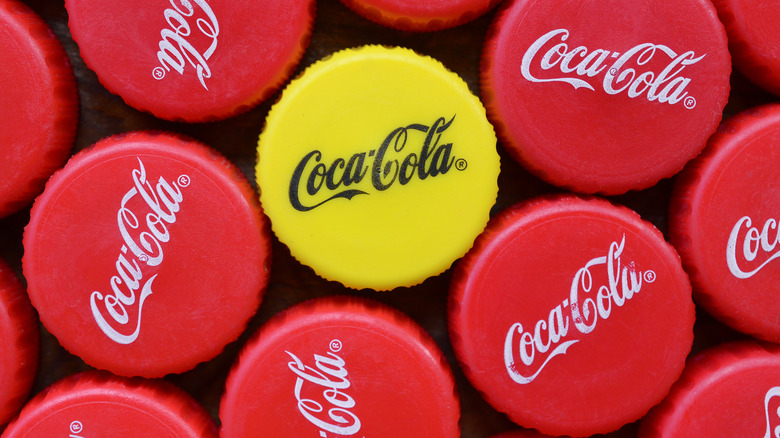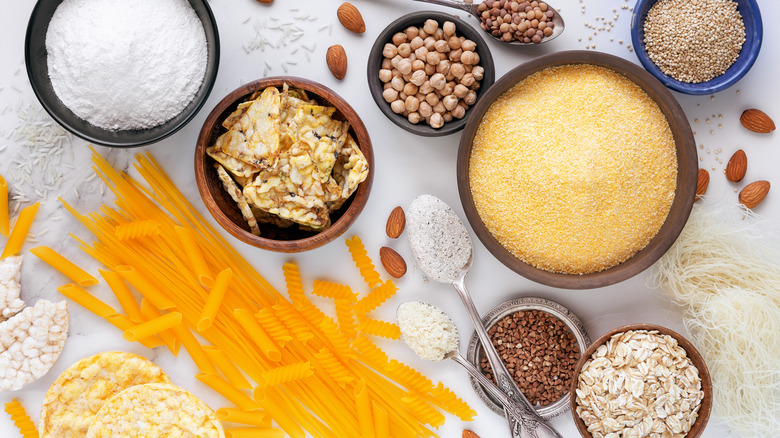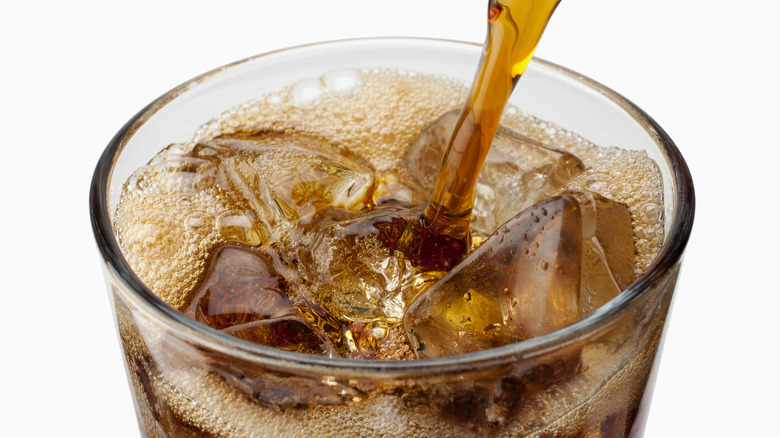Why Some Coca-Cola Bottles Have Yellow Tops
Coca-Cola fans may have noticed something different about bottles sold this April. Some Cokes in your local grocery might have bright yellow tops — a contrast to the usual red — which actually denotes a tweak to the formula of the drink. In the weeks leading up to the Jewish holiday Passover, and during the occasion as well, the brand sells a version of their iconic pop made without corn syrup.
Cokes with a yellow top use cane sugar or beet sugar to sweeten the soda, and are both certified kosher and safe for Jews who don't consume corn during Passover. During the week-or-so-long holiday, Ashkenazi Jewish people not only abstain from chametz, or leavened foods, but also kitniyot, or certain legumes and grains. Corn falls into the latter category, and therefore Coca-Cola has been releasing a limited-time kosher formula for decades now.
Pepsi also offers yellow cap bottles and a similarly-adjusted formula for a handful of its products. What's really compelling is that some drinkers seek out yellow-capped Coke just for the taste. Shoppers interested in trying a bottle will likely only find them in stores near large Jewish populations, so not every grocer will carry them. The sodas are also available only for a brief time around the annual celebration, so make sure to act fast if you spot one.
Grains have a complicated place at the Passover table
During Passover, Jews are forbidden from eating leavened bread — that's why you'll see plenty of matzo, a special unleavened cracker, on store shelves during the holiday. The rules around acceptable foods extend far beyond the use of yeast, and practices also vary from culture to culture. To make things even more complex, the rules also sometimes change — a group of Conservative rabbis recently decided certain grains and legumes are kosher for the holiday, but not all denominations or communities have taken to this thinking.
Just as some Jewish people don't eat rice on Passover, many continue to avoid legumes and other grains, like corn. This tradition is most prevalent among Ashkenazi Jews (those with roots in Central and Eastern Europe). Sephardic, Mizrahi, and other Jewish people around the world follow different traditions and rules, resulting in strikingly different Passover celebrations and dishes. In Italy, for example, risotto might actually make an appearance on the table.
The appearance of Coca-Cola's annual yellow caps may be news to some, but it's actually a practice that dates back nearly 100 years, to 1935. Jews living in the American South asked the Atlanta-based company to create a soda that could sustain them through the holiday, and the brand obliged. Today, the yellow caps continue to make an appearance every year and are sought after by Jews and non-Jews alike.
Coca-Cola for Passover finds a new audience
Passover Coca-Cola's use of sucrose (a naturally-derived sugar) in place of corn syrup actually makes it similar to Mexican Coke, which always uses sugar instead of the corny stuff. This product has amassed a cult following outside of Mexico, as fans say it has a cleaner taste and a less sticky mouthfeel. Some soda fans (and even bars and restaurants) go to great lengths to import glass bottles of Mexican Coke. Yellow-capped Coke is similar enough that Americans of all backgrounds can taste the difference between sugar- and corn syrup-sweetened bottles.
Although the kosher for Passover beverage is packaged in plastic bottles, the flavor is the same, not to mention the cost is lower than if you order Mexican Coke online or seek it out in specialty shops. If you and/or your friends don't keep Kosher, try conducting your own taste test of sucrose vs. syrup. Notably, bartenders also enjoy putting sugar-sweetened Coke to use in cocktails, where the cleaner taste can create a better flavor.
Other popular snack foods that are made kosher for Passover, like Lay's potato chips, don't inspire the same frenzy as Coca-Cola — for now. Products that might generate more buzz over the years are gluten-free snacks and treats made for Jews avoiding certain grains, but which also appeal to those who eat gluten-free year round. Some companies that focused on GF products for Passover have even decided to do so all year to meet demands.



